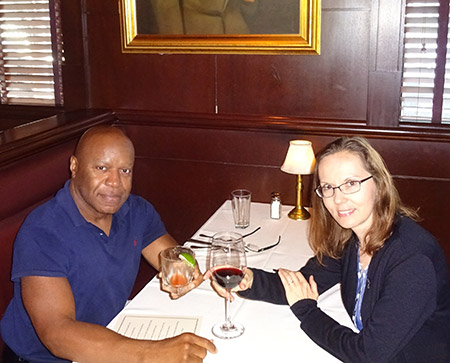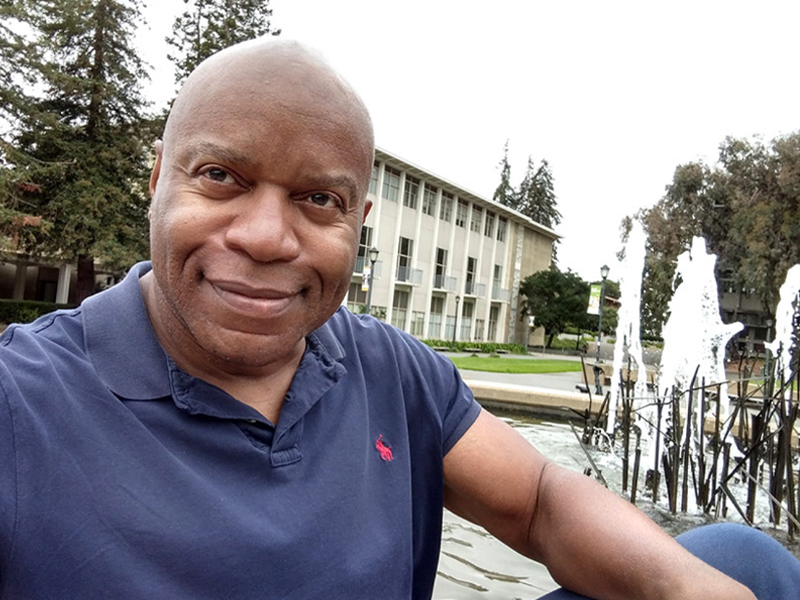Blowing the Whistle: LL.M. Student Shenandoah Titus Targets Workplace Harassment
Article from law.berkley.edu written by Andrew Cohen
Even though they led him to the current position he loves, Shenandoah Titus wouldn’t wish the circumstances on anyone.
While working at the U.S. Department of Homeland Security (DHS) headquarters in Washington, D.C. — ironically as program manager of the agency’s first anti-harassment unit — he says he was pressured by senior officials to lie to Congress regarding a sensitive issue.
“As a matter of honor, I refused to lie to Congress, which also is a federal crime,” Titus explains. “Consequently, I experienced harassment, bullying, and retaliation from senior management because I did the right thing and actually provided the truth to Congress on the matter in question.”
He resigned and took legal action against DHS — where he had received the agency’s Award for Excellence — and reached a satisfying settlement, receiving all of his demands for relief.
“Many people underestimate the impact of workplace bullying, harassment, and retaliation,” says Titus, a Berkeley Law LL.M. student. “This impacts people in very serious ways, including having a detrimental effect on one’s health, finances, family relations, and more. In extreme cases, workplace abuse can lead to fatal workplace violence or suicide.”
Leading by example
Rather than spend his settlement award on a new car or a lavish trip abroad, he used it to create the Whistleblower Anti-Bullying Resource Network (WARN) on Independence Day — July 4, 2018. The organization provides resource networking, complaint review, and legal representation for whistleblowers, survivors of workplace bullying and harassment, and people who have experienced police abuse.
Titus is chief counsel and leads a director of social media and a chief financial officer/senior advisor, and also collaborates within a global network of whistleblower professionals. He plans to soon hire attorneys to help him take on legal matters nationwide, beginning with the D.C. area, where he is licensed to practice law.

Having worked in municipal, state, and federal government leadership positions for 21 years, Titus was the human rights director of two cities in Massachusetts, served on the Attorney General’s Task Force on Hate Crimes, and was the Massachusetts Bay Transportation Authority Police Department’s director of community policing and partnership programs.
“In addition to helping whistleblowers, WARN’s equally important objective is to confront police harassment and brutality issues in America,” Titus says. “We plan to address racial profiling and promote professional, ethical policing.”
Titus describes his jarring DHS experience in vivid detail in his book — The Whistleblower: Defeating Bullies, Harassers and Management Gang Retaliation. Available on Amazon, it has a 5-star rating among dozens of reviews.
“This is not important for the sake of my ego,” he says. “Rather, it has been wonderful knowing that my story and insights have helped people across America and in Europe cope better with their experiences and become stronger and wiser in dealing with workplace bullies. That’s really the ultimate goal of my book and our work at WARN. We seek to remind people that they’re not alone.”
Choosing Berkeley
Having earned four academic degrees, mainly from Cornell and Harvard, Titus’ quest for learning and self-improvement continues at Berkeley Law. An executive track LL.M. student who will return next summer to complete his studies, he says he relishes the campus’ beauty, the city’s vibrance, the pleasant climate, and the friendliness of those he’s met.
Titus also describes a “great sense of pride” walking the halls once traveled by Earl Warren, a 1914 Berkeley Law graduate he calls the U.S. Supreme Court’s most influential chief justice and credits for presiding over Brown v. Board of Education, the seminal 1954 case that overruled the so-called separate but equal doctrine.
“Most prestigious law schools are rather staid, conventional, and uninteresting,” Titus says. “In the social justice arena, Berkeley Law was always my top choice for an LL.M. degree due to its reputation for producing change agents. I feel absolutely honored and proud to be a future alumnus of an institution as great as Berkeley Law.”
As for his work at WARN, he sees “public ignorance and apathy” as the most daunting hurdles to creating positive change within workplace culture and police abuse.
“Many people simply accept that work should be hell. On the policing front, many people of privilege feel that as long as ‘Officer Friendly’ doesn’t mistreat me or someone I care about, it’s alright if police officers abuse ‘those people,’” Titus says. “At WARN, we hope to change these attitudes. We view workplace abuse as well as police abuse as human rights violations. And we’re committed to bringing about needed change.”

